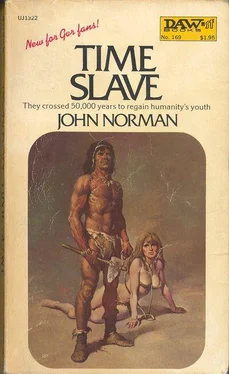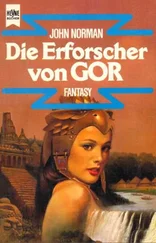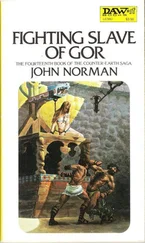“Which is?” asked William.
“The reality,” had said Herjellsen, “and the power.”
“The distinction, you said,” commented William, “was ultimately dubious.”
“I think so,” had responded Herjellsen, “because the phenomenal is itself a mode of the reality; it is a way in which the reality sees itself, a perspective, perhaps one of an infinite number in which the reality chooses to reveal itself. Thus, I see no complete and categorical distinction between ourselves and the reality. Indeed, the distinction itself seems relativized to our modes of consciousness. In the reality itself such a distinction would be, one supposes, meaningless.”
William had shaken his head.
“Oh, we are quite reap” had laughed Herjellsen. “We are as real as anything that is real; it is only that there are other manifestations, other truths, other dimensions, that are quite as real as ours.”
“How do you know?” demanded William.
“I do not,” said Herjellsen. “But it seems to be likely. It seems implausible, does it not, that our handful of categories, our tiny, evolving package of sensibilities, our tiny phenomenal island of awareness, emerging from sensed, but uncharted seas, should be unique.” Herjellsen had then leaned back. “Rich as we are, I suspect,” he had said, “we are only one penny in the riches of reality.”
“What is the reality in itself?” demanded William.
“We are one thing, I suspect,” had said Herjellsen, “that the reality is in itself-but what other things the reality may be in itself I do not know.” “Is the reality to be distinguished,” had asked Gunther, “from the totality of its diverse phenomenal representations or manifestations?”
“I think so,” whispered Herjellsen. “I think that it is in itself these manifestations, but that it is, in itself, too, more.”
“This seems contradictory,” said William.
“I do not think so,” said Herjellsen. “Representations or manifestations are not like shells or costumes in which something else hides; they area way in which reality, in itself, truly, has its being; they are not other than the reality but a way in which it is; but, too, it seems probable that reality’s riches, in their unmanifested profundity, exceed phenomenal expressions. It is not that the phenomena are not reality, but that there are realities beyond phenomena. Reality contains, I suspect, depths and inexpressibilities beyond those of any set of. phenomenal configurations.”
“This is hard to understand,” said William.
“The words `in itself’ are hard to understand, perhaps unintelligible,” said Herjellsen. “Perhaps they are misleading. Let us forget them. Let us think what might be meant, not trouble ourselves with a particular semantic formulation. I am saying that there is no adequate distinction, in this matter, between real and unreal. All that exists is equally real. All that I wish to say is that there is a reality-doubtless identical with all that exists-but that this reality far exceeds our perspectives upon it, or those of other perspectives. It is, perhaps, infinitely profound and inexhaustible. There is more to it than we see. It is not that it is not as we see it, but that it is also other than we see it. And perhaps, if we held other perspectives, we would see that it was also other than we conceived it.”
“Granted these things, supposing them intelligible,” said William, “is it not your belief that in extraphenomenal reality, reality as it is apart from our particular, or some particular, mode of experience, time and space do not exist?”
“Certainly not as we conceive of them,” said Herjellsen. “Time and space, as we conceive of them, are irrational. It seems irrational both that space should be infinite, that it should have no end, and irrational, too, that it should at some boundary terminate, for what would be on the other side?”
“What of an expanding, finite space?” asked William. Hamilton’s mind had swept to a speculative conjecture common in astrophysics.
“Irrational,” said Herjellsen. “What is it expanding into?”
William looked angry.
“What if it were closed and static?” asked William.
“What would lie outside its sphere?” asked Herjellsen.
“That question would be answered ‘nothing,”’ said William.
“Yes,” said Herjellsen, “but scarcely answered rationally.” He smiled. “A sphere requires place,” he said.
“What of the Moebius strip?” demanded William.
“It, too, requires place,” smiled Herjellsen.
“I suppose there are difficulties,” admitted William.
“Too,” said Herjellsen, “consider time-it is irrational both to suppose that it had a beginning and that it had no beginning-each hypothesis affronts the intellect, challenges sanity itself.”
“So, then,” said William, “space and time are irrational?”
“Space and time, as we conceive of them,” said Herjellsen, “make little sense.”
“So what should we think?”
“We should think at least,” said Herjellsen, “that they may not be as we conceive of them.” He smiled. “They are relative, in my conjecture,” said Herjellsen, “to our mode of perception-I think it quite unlikely that they characterize, or characterize in the same way, the reality as it is apart from our sensibility. It may be that what we experience as space and time is, apart from our experience of it, quite unlike space and time.”
“This sort of thing,” volunteered Gunther, “is quite common in science, though seldom extended to space and time. The distinction between the sensibility-dependent and the sensibility-independent property is germane. Sound, for example, considered as physicalistic atmospheric concussions is quite unlike the auditory phenomenon of listening, say, to a symphony. The reality is like blows; the auditory phenomenon is music. Similarly with other properties. Consider color, as the physicalistic property of a surface, selectively absorbing and reflecting waves of light. This is quite different from the painting one sees or the blue sky. The world of physics is one of particles and motions, of invisible motions, silent, unlit, dark, hurried. But our world of experience, the human world, is bright with sound, with feeling, taste and touch, with odors, with light and color. Our sensors dip into alien spectra. Our brain is a transducer that transforms physical energies into a human experience, one congruent with the world of the physicist, and yet quite different from it.”
“You are familiar, are you not,” asked Herjellsen of William, “with the distinction between the sensibility-dependent property and the sensibility-independent property?”
“Any educated man is,” said William. “That distinction dates from the time of Galileo.”
“From the time of Leucippus and Democritus,” corrected Herjellsen.
“Very well,” said William.
“It is then my belief,” said Herjellsen, “that time and space, as we conceive them, are sensibility-dependent, a mode of our sensibility, a condition for experience, given whatever we may be. That we experience the reality spatially and temporally does not imply that the reality apart from our experience is as we conceive it to be. That we experience a bright yellow does not imply that in the physicist’s reality such a yellow, apart from our experience, exists. That we experience a symphony of Beethoven does not imply that in the physicist’s reality such music, apart from our experience, exists as we experience it. Rather it would be only a pounding on the skin. For the lobster, for the sponge, for the spider, it presumably would not exist, not as music. Similarly, of course, for them there might be beauties and rhythms that would be lost on us, we lacking the appropriate sensors, the appropriate sensibility.”
Читать дальше












